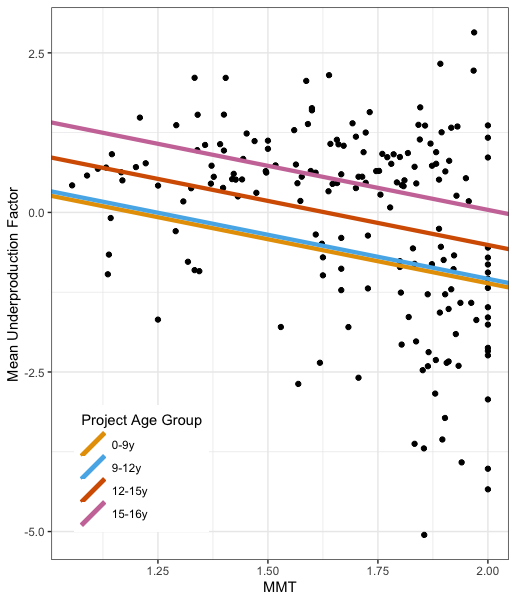What structure and rules are best for communities producing high-quality free/libre and open source software (FLOSS)? The stakes are high: cybersecurity researchers are raising the alarm about cybersecurity risk due to undermaintained components in the global software supply chain—much of which is FLOSS. In work that’s just been accepted to the IEEE International Conference on Software Analysis, Evolution and Reengineering (‘SANER’), we studied 182 Python-language packages in the GNU/Linux Debian distribution, examining the relationship between their levels of engineering formality and software risk. We found that more formal developer organization is associated with higher levels of software risk, and more widely spread developer responsibility is associated with lower levels of software risk.
We studied software risk through the underproduction metric initially developed by Champion and Hill (2021). Underproduction is a measurement of misalignment between the usage demands of a software project and the contributions of the project’s developer community. As such, underproduction measures the risk that software will be undermaintained, possibly including a security bug.
Our work examines the relationship between risk due to underproduction and governance formality. We employed measures initially developed by Tamburri et al. (2013) and later re-implemented in Tamburri et al. (2019). These metrics use multiple measures of software project formality — such as the average contributor type, usage of GitHub milestones, and age — to evaluate how formally structured a given project is.

We used linear regression to conclude that more formal project structures are associated with higher levels of underproduction and thus, increased project risk. We also found that the share of community-members who have merged code into the main development branch is also related to underproduction, with lower levels of underproduction correlated with larger shares of community mergers.
Evaluated together, these two conclusions suggest that operating less formally and sharing power more equally is associated with lower underproduction risk. The development of FLOSS project engineering is a process laden with tradeoffs, we hope that our conclusions can help better inform community decision making and organization.
For more details, visualizations, statistics, and more, we hope you’ll take a look at our paper. If you are attending SANER in March 2024, we hope you’ll talk to us in Rovaniemi, Finland!
—————
The full citation for the paper is:
Gaughan, Matthew, Champion, Kaylea, and & Hwang, Sohyeon. (2024) “Engineering Formality and Software Risk in Debian Python Packages.” In 31st IEEE International Conference on Software Analysis, Evolution and Reengineering (SANER2024) (Short Paper and Posters Track). Rovaniemi, Finland.
We have also released replication materials for the paper, including all the data and code used to conduct the analyses.
This blog post and the paper it describes are collaborative work by Matt Gaughan, Kaylea Champion, and Sohyeon Hwang.
Discover more from Community Data Science Collective
Subscribe to get the latest posts sent to your email.